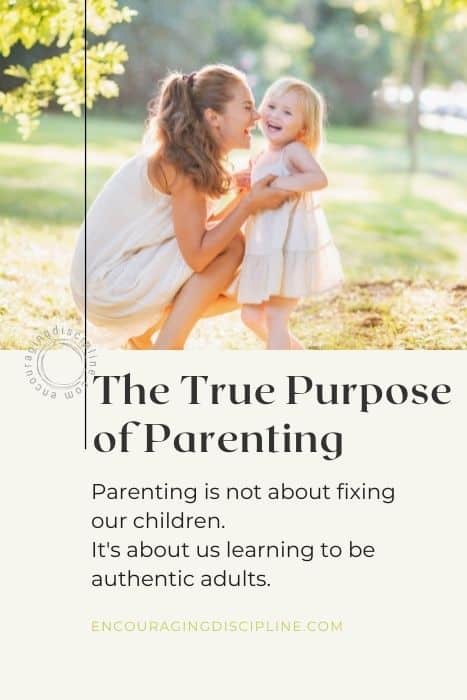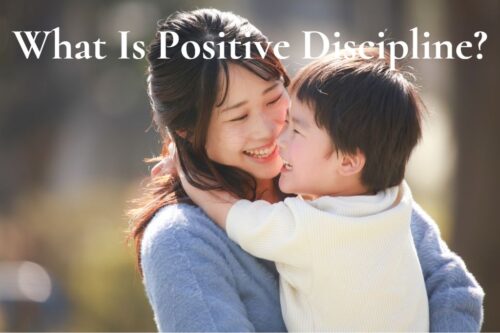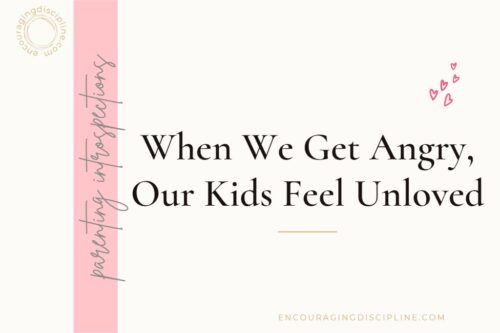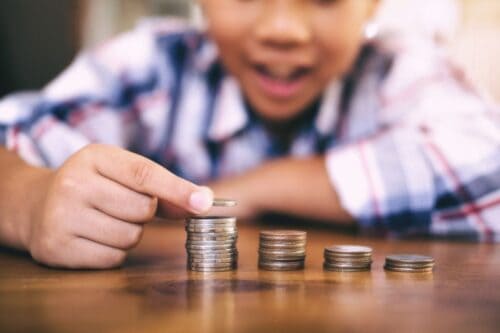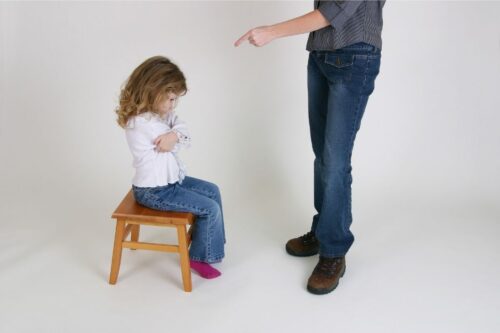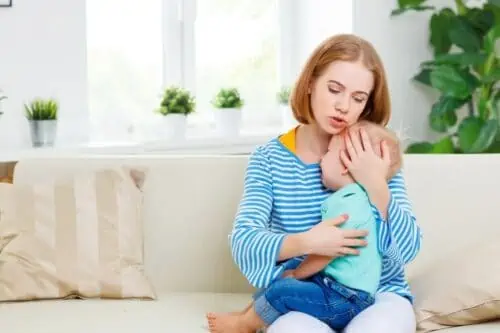What’s the True Purpose of Parenting?
Do you ever stop to think about what the purpose of parenting is? I mean, sure, we have to teach our kids life skills, to take care of themselves and others, to have values and resilience. And all these are important. But I am thinking even more deeply.
What should parenting feel like and what is our role in it? Do you ever wonder if you’re doing it right? How do we get to enjoy it more?
I’ve always thought a lot about these things. I want to make sure that my kids know how much I love them without being spoiled and without me burning out.
Table of Contents
When We Start Receiving Bad Advice
When our kids are born, we find ourselves loving more deeply than we’ve ever loved before. We’re enthusiastic, we give everything to our babies and they are so responsive. There’s a magical connection, filled with joy. And we don’t think too much about the purpose of parenting because things are so easy and enjoyable.
But then babies grow up into kids and the bliss starts to fade. We seem to be on a crazy rollercoaster ride. And we begin to wonder what the heck happened. How did we get from total flow to constant power struggles? And that’s when we begin to look for discipline and parenting advice.
I’ve never liked the mainstream parenting advice and expectations of our modern culture. It positions us and our children in opposing teams and is filled with strategies for controlling them and getting them to do what we want. Many of us may feel like magicians at a kids’ party, having to constantly pull new tricks out of our hats. Parenting like this can feel exhausting. And, very importantly, all of this advice is counterproductive and I dare say dangerous. Because it undermines the true purpose of parenting and destroys the most sacred thing that we have, which is our relationship with our children.
And finally, then we begin to wonder: what is the purpose of parenting anyway?!
What Is Parenting About?
You see, I started thinking about the purpose of parenting long before having kids. Believe it or not, I began questioning the role of parents when I was still a child. As I was watching the adults around me, something seemed off. I promised myself two things:
- that I would never forget what it feels like to be a child,
- and that I would not become like the adults I was seeing in my life.
And so, when I was older, I tried living my life in a way that was respectful and curious toward children. And I thought I was doing a pretty good job.
But years later, after having kids, I realized I had become exactly like the adults I had promised myself I wouldn’t be. It was so strange! But there I was, same reactions, the same language even. And I looked back at my life before kids to see what had happened. And I started seeing things with different eyes. I realized that, in fact, I had been like the rest of the adults all along. I had been living an illusion.
Had it not been for my kids, I would have continued to live my life that way unknowingly.
Then I heard many smart people say that parenting is not about our kids, it’s about us. And while this sounded true, I couldn’t quite go deep enough to really figure out what it really meant.
But now I found the grain of dust around which all the ideas that have been coming to me in waves over the years began to condense.
Parenting Is Not About Doing Something TO Our Children
We’re told parenting is about changing our children’s behaviors and making them good people. As if our children are a problem. And it’s our life project and even our responsibility to fix it.
But that’s not what parenting is about. Our children are not our next craft project. And they are not our enemies either. They’re not here to give us a hard time or to make us suffer. They are not bad, savage, lacking creatures that we have to fix and turn into good, worthy people.
The Purpose of Parenting Is to Grow Ourselves
Parenting is about us. It’s the next step in our life. Parenting is about continuing to grow and learning to be an adult: learning to feel like an adult, show up as an adult, and respond as an adult.
Now you may tell me, “But wait, I’ve been an adult for the past 15-20 years. I’m surrounded by adults.” So let’s think about that for a moment and be honest with ourselves. Does everyone around us behave like adults? Do we always respond like adults? Do we feel like adults? And do we even know what it means to feel like an adult?
Sure, some of us may seem like we’re doing great at being adults. But that’s just because we have set up our lives in such a way that we can seem in control and act the way we think adults should act.
Yet the truth is we’re just pretending. And how do I know we’re not for real? Because as soon as we’re faced with resistance and things don’t go our way, we flip out. Our reactions give us away. We can’t manage disruption and we feel overwhelmed.
Are We Just Pretending to Be Adults?
We think an adult should carry themselves this way, and speak that way. On the outside, we try to emulate this image of the adult that we have. But I would argue that most of the time, deep inside most of us just feel like children.
So when we become parents, we think we have to continue our adult pretend game. Which is controlling and setting everything up in a way that enables us to keep playing our adult role undisturbed.
The problem is that, while other grown-ups around us understand and follow the rules of this pretend game most of the time, our kids come into this world and they’re not in on the secret. They just are themselves. Authentically and fully children. And they won’t play by our rules.
So in the beginning when we try to control and shape our kids, they rebel, push back, or pull away because we’re forcing them to adopt a life and identity and to conform to a made-up world that’s just not aligned with what life is to them.
And then what do WE do when we find ourselves in a game in which other kids don’t allow us to control and be the boss? We get angry and upset at our children for not playing along and following our rules. We become even more adamant about controlling.
We even blame our kids for making us flip our lid when things don’t go our way. We’re not taking responsibility for our own reactions.
Aren’t we acting like children then? The truth is an adult would not engage in a tug of war with little kids about who’s the boss.
Related: 20 Self-Care Practices for Busy Moms
Why Do We Control?
I remember when I was a preteen, I heard the adults in my life talking about how they had to shape us, the children, so that we became “good people”, otherwise we would end up with questionable characters.
And I remember feeling offended by that. I was thinking “I don’t need you to mold me, I’m not a piece of clay. I already am who I am. And I like who I am. And I don’t want you to make me into who YOU think I should be.”
I wasn’t using those exact words, but now I’m giving form and expression to my thoughts and feelings that I was having back then.
Now, if we think about it, when we talk about molding or shaping our kids, what that really means is teaching them the rules of our game so that we can continue pretending to act like adults unperturbed. And the sad part is that oftentimes we can get our children to play by these rules, but that separates them from their authentic selves and who they really are. And we rob them of the opportunity to grow into authentic adults themselves.
Parenting Is Our Opportunity
The reason why parenting is such a good opportunity to grow and learn to become adults is that finally, we get somebody in our lives who doesn’t follow these made-up adult world rules.
In a sense, our children are holding up a mirror in front of us so that we can see who we really are.
And we are just as immature as they are. The only difference is that we inhabit a bigger body and we learned a few tricks over the years. But we see that that doesn’t make us adults.
When our children hold up the mirror and we can see our true reflection, then we have the opportunity to let go of the pretend game and start to really dig deep to find the authentic adult inside of us and let it grow out. Or we can keep pretending and fighting our kids. It’s up to us.
The great thing is that once we allow ourselves to grow into our authentic adult, that’s how we begin showing up in all of our relationships, not just for our kids. And we begin having a real impact on the world. We find peace and happiness.
Great Responsibility
Ideally, we want to not shape and mold our children, but to create a safe space for them to grow into themselves.
But you see, every experience, every word, and every interaction shapes every human being.
So, when I was a child, thinking I didn’t want the adults in my life to mold me in whichever way they wanted, I didn’t know that everything and everyone still left an imprint on me.
And so, we do shape our kids. But we have to accept this with great responsibility. It shouldn’t be our life project to create a small box for our kids to fit in. Instead, we should be careful to mold as little as possible, while creating a safe space for our children to follow their own path of growth toward authentic adults.
The purpose of parenting is not to shape and control our children. Parenting is about letting go of our fabricated adult identity and growing into real adults ourselves.
